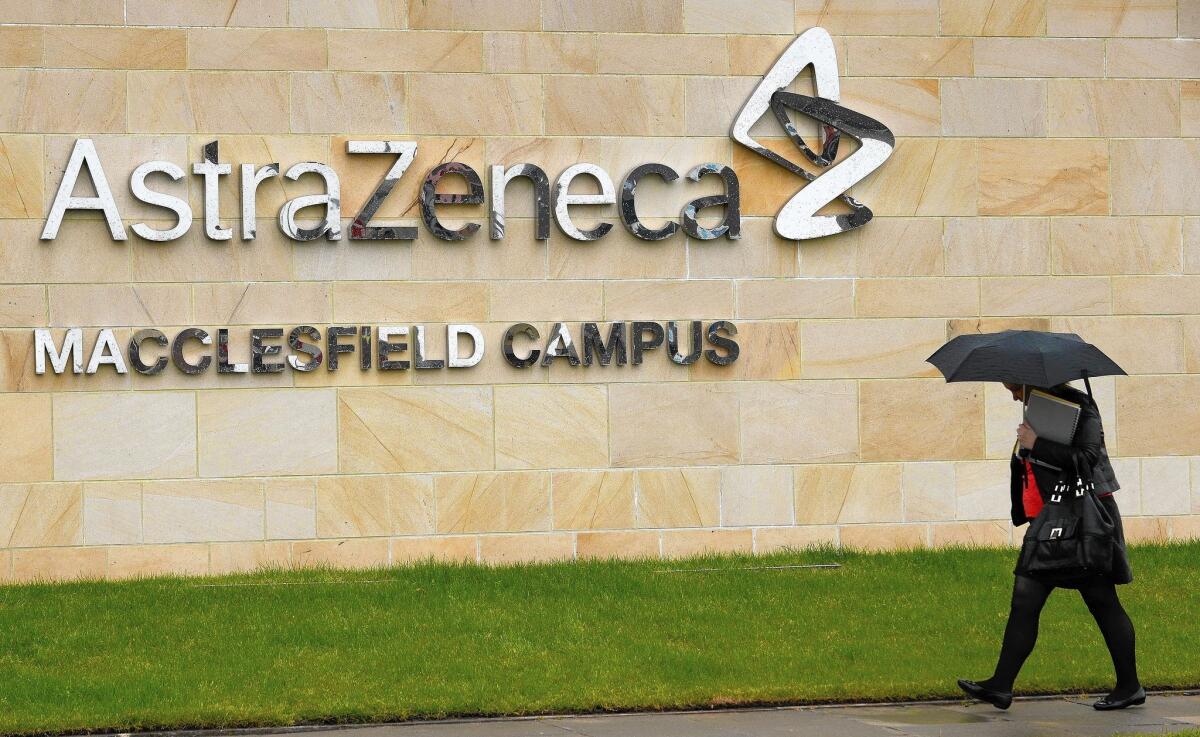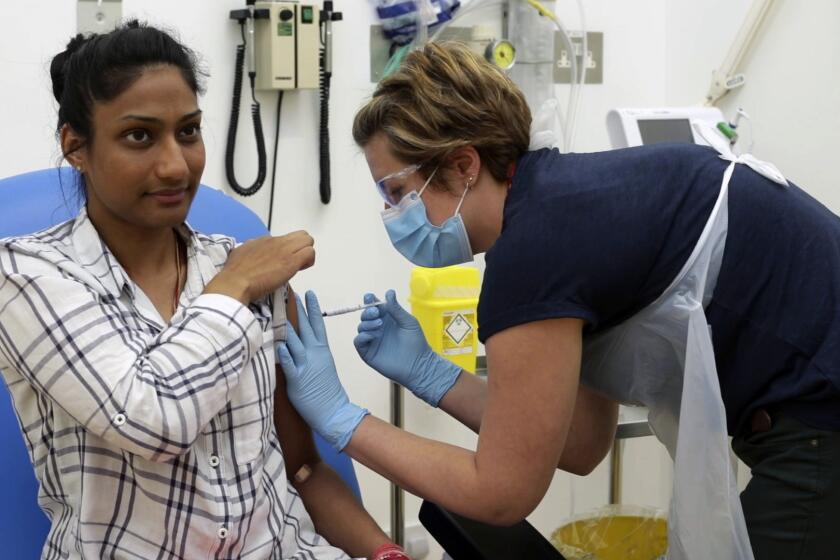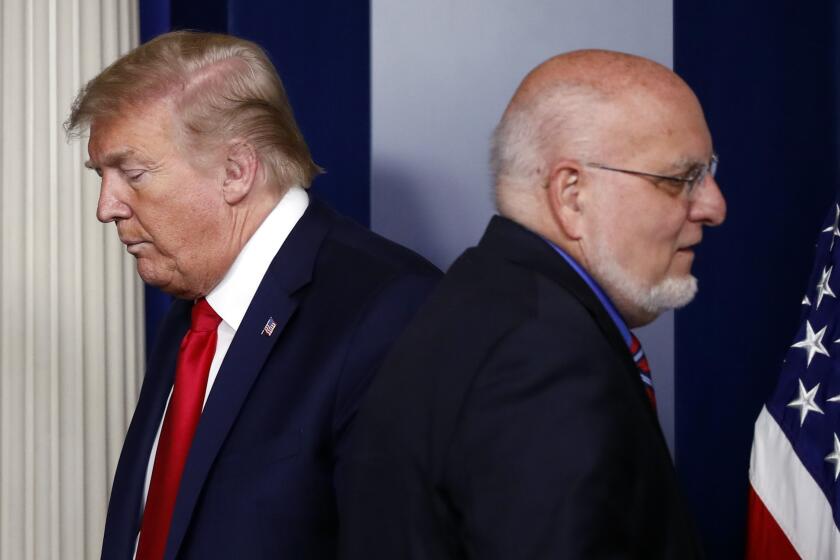Column: Drugmaker AstraZeneca teaches Trump why the virus hunt can’t be rushed

- Share via
Donald Trump’s effort to force science into serving his reelection campaign ran into a pothole Tuesday.
That’s when AstraZeneca, a drug company testing one of the more promising potential vaccines against COVID-19, suspended its product’s clinical trial.
The reason was that one trial subject developed what the company described as a “potentially unexplained illness.”
A couple of reality checks are warranted here.
In large trials, illnesses will happen by chance but must be independently reviewed to check this carefully.
— AstraZeneca, announcing a pause in its COVID-19 vaccine trial
First, there’s nothing unusual about this development. They happen routinely in clinical trials and aren’t unexpected when a trial comprises as many as 30,000 subjects, as this one does.
Second, AstraZeneca hasn’t disclosed the nature of the illness or even if it’s connected to the vaccine under study as, perhaps, an adverse side effect. “In large trials,” the company said in a public statement, “illnesses will happen by chance but must be independently reviewed to check this carefully.”
There are no indications, as yet, that the suspension will be prolonged or how it might affect clinical trials of other vaccines. Three candidates, including the AstraZeneca vaccine, which is being developed in conjunction with the University of Oxford, are undergoing Phase 3 trials in the U.S. and elsewhere.
The others, based on a messenger RNA model never before used on humans, are under development by Moderna and by Pfizer. The AstraZeneca vaccine uses a different technology.
But the suspension — or “pause,” as it’s described by AstraZeneca — does remind us that the path of vaccine development is not smooth or swift but generally throws out curveballs that need to be studied and explained.
That’s crucial to know in the context of the COVID-19 vaccine hunt, because it has been relentlessly politicized by President Trump, who is a scientific ignoramus.
History tells us that rushing a vaccine for COVID-19 will prove more hazardous than if it’s done right.
As recently as Monday, Trump was claiming that approval of a vaccine was imminent — “could even have it during the month of October,” he said. Trump’s goal is unmistakable: He wants to announce a vaccine on the eve of the election so he can claim victory over the virus.
Under normal circumstances, AstraZeneca’s announcement might not have produced even a ripple, outside the small community of researchers and investors who follow drug trials.
This time is different, both because of the intense public interest in a vaccine, and Trump’s interference in the process. AstraZeneca did the right thing in suspending its vaccine trial and announcing its action publicly.
Numerous medical and drug industry experts, including some from within the Trump administration, have cautioned that trial results justifying government approval of a vaccine any time in the next two months are unlikely in the extreme.
As Saskia Popescu, an epidemiologist at the University of Arizona, told me last week: “You need to enroll 30,000 people, you need to administer the vaccine and watch for any adverse outcomes, you need to do follow-up testing, and if it’s a two-step vaccine [requiring two separate doses] you need to bring them back 28 days later. Then you need to analyze the data. These things take time, and one or two months to have all that happen seems not even feasible.”
Trump’s record of cozying up to anti-vaccine advocates dates back more than a decade.
Trump’s preferred timeline assumes that the existing trials proceed perfectly. That means there are no unexpected events such as the one signaled by AstraZeneca and that the results show such a spectacularly effective immune response that the trials can be ended early. Neither is likely.
In fact, disappointment is the default outcome of clinical drug development. A majority of drugs that show promising results in early-stage trials never make it to market.
As we reported recently, in 2017 the Food and Drug Administration, hoping to tamp down inflated public expectations of medical research, listed 22 cases in which drugs with promising Phase 2 trial results failed to demonstrate effectiveness or safety in Phase 3. (Phase 2 trials involve small groups of subjects with the disease being studied.)
The AstraZeneca, Moderna and Pfizer vaccines are all at that cusp — they’ve shown promising results in Phase 2 trials but are just now starting Phase 3.
Those who defend Trump’s cheerleading for a vaccine sometimes argue that the public needs some good news in the pandemic these days — in other words, that Trump is feeding people good medicine.
That’s exactly wrong. No one benefits from false optimism. It won’t make the research move any faster. Nor will it give people confidence in the outcome.
The Trump administration is plainly counting on a vaccine for COVID-19 becoming approved by the Nov. 3 election, in the expectation that news of the discovery will inspire a tide of public optimism that will sweep Trump to reelection.
Quite the contrary: Trump’s overtly personal and partisan interest in an early vaccine approval has only served to destroy confidence that any approval coming before the election on Nov. 3 will be honestly earned.
Indeed, that’s why AstraZeneca, Moderna, Pfizer and six other major drug companies issued a joint statement this week assuring the public that they won’t be swayed by political pressure and will submit their vaccines for government approval only if and when that step is dictated by science.
Science, as a human endeavor, doesn’t care about Trump’s political fortunes. It is what it is. But acceptance of scientific judgment, which is an important issue in the quest for a vaccine, does care. If approval of a vaccine appears to be political, even if it’s based on rigorous research, then it will face a head wind of public doubt.
That will be devastating in the battle against the virus. Trump needs to shut up, and let the scientists do their work, wherever it leads.
More to Read
Inside the business of entertainment
The Wide Shot brings you news, analysis and insights on everything from streaming wars to production — and what it all means for the future.
You may occasionally receive promotional content from the Los Angeles Times.













